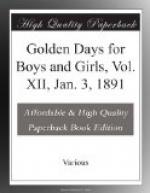Another exile, more meritorious, is Francesco, King of Armenia and Prince of Jerusalem. It has been many years since Francesco’s ancestors were driven by the Turks from the throne of Armenia, but there can be no doubt whatever of the royal antiquity of the family. Descended from a bold crusader, they held the kingly rank for centuries, until the rise of Mohammedan power in the East made them exiles. Russia, for many years, gave the titular prince a pension, but this was dropped about forty years ago, and since then the kings of Armenia have had a very hard time of it. The present king is a waiter in a small restaurant near Versailles. He is a quiet fellow, and does not parade either his pedigree or his misfortunes.
There can be no doubt that the number of royal exiles will increase with the passing years. The trend is all one way. Monarchies are giving way to republics all over the world, and once the people have the power in their own hands they will not relinquish it. Revolutions, however, nowadays are peaceful, and kings may thank their stars that they are no longer in danger of losing their heads along with their crowns.
A HAPPY NEW YEAR.
Nature has made no marked division between the new year and the old, and there is practically no difference in weather between the last week in December and the first week in January. Perhaps it would be more logical to have the year begin with the vernal equinox, but practically it makes no difference at all. The year begins on the first day of January in all Christian nations except Russia and her dependencies, and it is not likely that any change will be made in future.
Yet, although there is no natural division, custom has made one that we cannot help but notice. In the business and financial world the end of the old year marks a distinct epoch, and the first of January is the beginning of new accounts and new books. There is a general brushing up, so to speak, and a number of new rules enacted, even if they are never enforced.
There seems to be no reason why there should not be a moral brushing up, as well as a business one. On the first of January, why should not every one take an account of stock? Why not foot up all the good and bad done in the old year, and find out on which side the balance lies? If bad, it is a subject for correction; if good, it is a matter for congratulation.
It is not necessary for one to make the footings public, any more than a business man takes the outside world into his confidence, but a perusal may do a wonderful amount of good. Indeed, it is the only way by which one can learn to avoid a repetition of the errors of the old year.
The first of the new year is called “happy” doubtless on account of the good resolutions which inevitably spring from a contemplation of the past. It is the one day in the year when every right-minded person at least tries to do good, and it is an axiom that to be good is to be happy.




